
-
In this Issue:
- Governor's Message
- Register for the 2024 Vermont Chapter Meeting
- Call for Abstracts for the Vermont Chapter 2024 Annual Scientific Meeting
- Leadership Day Recap
- ACP Legislative Action Center
- Call for Spring 2025 Board of Governors Resolutions
- ACP Ethics, Professionalism and Human Rights Committee Update
- Diversity, Equity, Inclusion, and Belonging
- ACP Fellowship
- Green Mountain Medicine
- Annual Financial Report
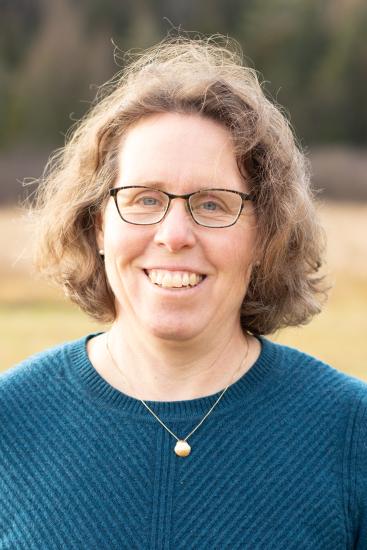
Priscilla W. Carr, MD, FACP, ACP Governor
Governor's Message
Greetings!
As the end of summer nears, I'd like to take a moment to highlight some of the VT ACP chapter activities. This time of year always feels frenzied to me as I feel a need to squeeze in just a few more summer activities before the school year and autumn chill encroach too much. I hope that you have all had a chance to rest and enjoy the outdoors this summer.
I am excited about the upcoming chapter scientific meeting on October 18 at the Trapp Family Lodge in Stowe, VT. See below for more information- there's an exciting group of speakers, and we've added a lunchtime town hall which promises to be a great discussion. We hope that you'll join us!
With gratitude,
Priscilla Carr MD, FACP
Register for the 2024 Vermont Chapter Meeting
The chapter's annual scientific meeting will be held on October 18, 2024 at Trapp Family Lodge in Stowe, VT. Register Today
Call for Abstracts for the Vermont Chapter 2024 Annual Scientific Meeting
We will host an in person Medical Student and Resident/Fellow abstract competition in conjunction with the 2024 Vermont ACP Chapter Scientific Meeting on October 18, 2024. The submission deadline for abstracts is September 13, 2024. Further information is available here.
Leadership Day Recap
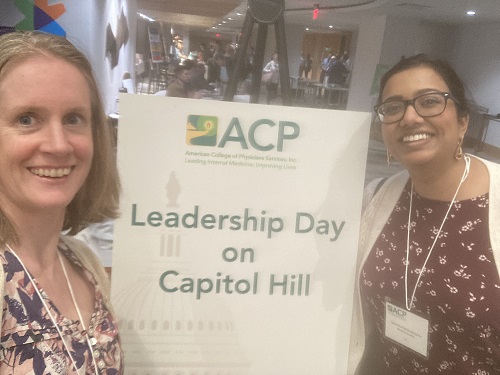
Alison Landrey MD, FACP and Vennela Pandaraboyina, UVM medical student, travelled to Washington DC for the ACP's Leadership Day in May. They enjoyed the opportunity to learn more about ACP's Advocacy efforts and engage with the VT delegation on Capitol Hill!
Watch for news of the next ACP Leadership day in May 2025!
ACP Legislative Action Center
Join more than 15,000 colleagues in the AIMn program in advocating for the interests of internal medicine in Washington DC. By joining, you will receive legislative updates on key policy issues and engage in outreach to your federal lawmakers.
Learn more and enroll in the Advocates for Internal Medicine Network here
Call for Spring 2025 Board of Governors Resolutions
Are you concerned about a practice or clinical issue or have an idea you'd like to suggest? If so, you might consider submitting a resolution to the VT chapter council. The deadline for submitting new resolutions to be heard at the Spring 2025 Board of Governors Meeting is September 27, 2024. For further information see the Chapter website or contact Priscilla Carr
ACP Ethics, Professionalism and Human Rights Committee Update
VT Chapter member Jan Carney MD MACP shared this recent publication Ethics and Academic Discourse, Scientific Integrity, Uncertainty, and Disinformation in Medicine: An American College of Physicians Position Paper .
Diversity, Equity, Inclusion, and Belonging
Read the most recent DEIB column by Simrun Bal MD, Exploring Indigenous History in Vermont
ACP Vermont DEIB Corner: Exploring Indigenous History in Vermont
By Simrun Bal, MD
Dr. Bal lives in Burlington, VT, where she practices outpatient internal medicine at the Burlington VT Veterans' Affairs Clinic (affiliated with the White River Junction VA Medical Center).
For the summer ACP newsletter's DEIB (Diversity, Equity, Inclusion, and Belonging) Corner, we'll explore a brief overview of the Abenaki people, the Indigenous peoples of what is now called Vermont.
As a brief background, the Wabanaki Confederacy is made up of five Indigenous nations: Abenaki, Malecite, Micmac, Passamaquoddy, and Penobscot. The term “Wabanaki” refers to “People of the Dawnland,” as “Waban” refers to “light or dawn” and “Aki” refers to “land.” (1) The population of the Wabanaki Confederacy is still active and present on its ancestral territory, and comprises about 3,000 people.(2) Vermont is part of the homelands of the Abenaki and is known as N'dakinna.
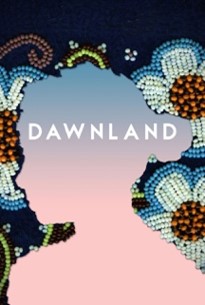
In Vermont, there are four state-recognized Western Abenaki tribes:
- The Elnu Abenaki Tribe – traditional territory in southern Vermont
- The Koasek Traditional Band of the Koas Abenaki Nation – traditional territory in central and northwestern New Hampshire and northestern and central Vermont
- The Nulhegan Band of the Coosuk Abenaki Nation – traditional territory in the Upper Connecticut Basins of Vermont, northern New Hampshire, and the eastern townships of Quebec
- The St. Francis-Sokoki Band of the Abenaki Nation of Missisquoi – traditional territory in northwestern Vermont
In the early 1600s, about ten thousand Abenaki lived in Vermont and grew crops, built villages, and farmed the river floodplains of Vermont, with archeological evidence that this occurred as far back as 1100 A.D. The Abenaki traditional cultures tend to be egalitarian and kinship-based.
In 2011 and 2012, the above tribes received recognition from the state of Vermont.
To achieve health equity, it is crucial to understand the histories of particular communities – and in Vermont, it's important for us to continue to learn from and about the history of the Wabanaki. The Vermont Department of Health outlines relatively recent health statistics that one can explore and notably has a Community Lens piece written by Chief Joanne Crawford, of the Abenaki Nation of Missisquoi. She describes the struggles with historical and intergenerational trauma that exacerbate the current mental health and social challenges that many in this population are facing. She also writes eloquently of ways we can help:
“How do we help? Include Indigenous people in the data, work with the tribes to find culturally appropriate programs that work for their community, provide equitable support, services and funding, and include them in your advisory panels, councils, and boards. It is important for agencies and organizations to engage with Indigenous communities with transparency and recognition of the expertise of their lived experiences in order to sustain authentic working relationships.” – Chief Joanne Crawford, Abenaki Nation of Missisquoi, Excerpt from Vermont Dept of Health
One excellent example of a community-driven health initiative is by the Vermont Abenaki Artists Associations (VAAA). (3) The VAAA began a program called Waolôwzi, referring to the Abenaki phrase “be very well” and “continue to live very well.” It was originally built for the COVID-19 pandemic but has expanded to seek to improve the health of the community. They have conducted health clinic and eye exams at the annual Abenaki Heritage Weekend (June 2024), provided over 780 COVID-19 testing kits to the Native American community, provided PPE to Abenaki artists, Elders, and community members, and more. Another example is that of the Abenaki Nation of Missisquoi, which holds educational programs related to diabetes and hypertension, as well as monthly vaccine and health clinics. (4)
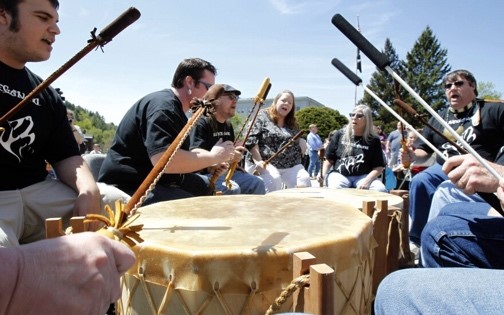
Resources to learn more about Abenaki culture and heritage include:
- Alnôbaiwi– a nonprofit focused on the preservation of Abenaki culture and heritage,
- What is the Status of the Abenaki Native Americans in Vermont Today? – an excellent radio show by Brave Little State (2016)
- Abenaki Arts and Education Center
- Abenaki Alliance
Image sources:
Footnotes:
ACP Fellowship
Fellowship in the American College of Physicians is a peer-reviewed and peer-supported credential that is a public reflection of excellence within the internal medicine profession. FACP signifies an ongoing dedication to the profession of internal medicine, the patients we care for, and the communities we serve.
Learn more and apply for Fellowship here
Sponsor a new Fellow here
Green Mountain Medicine
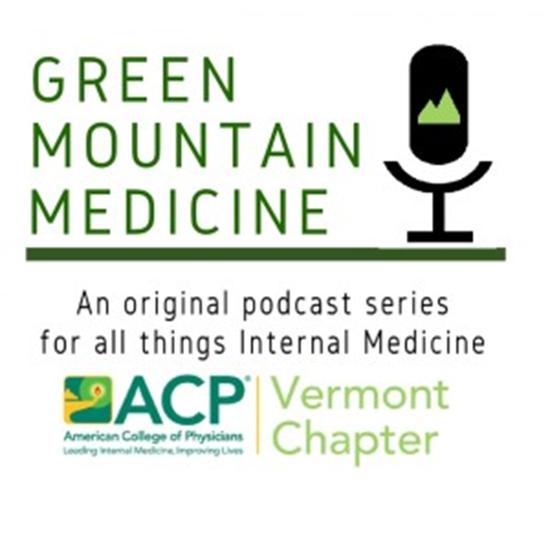
Green Mountain Medicine is an original podcast series for all things internal medicine, sponsored by ACP Vermont. Hosted by University of Vermont medical students Caity Decara and Haley Bayne, this podcast deconstructs the topics that impact the field and characterize the practice of medicine. Episodes are also available on Spotify, Apple Podcast & Google Play Music!
Annual Financial Report
Please see the annual financial report here.

